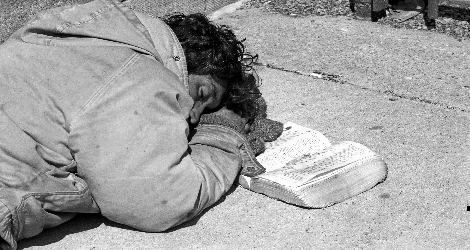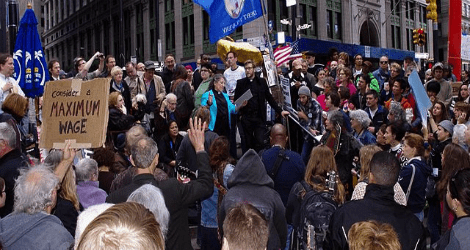For the Bible Tells Me So
Now then, what does the bible tell us about God’s call to do justice?
The answer starts on the very first pages of scripture in the story of creation!
Then (on the 6th day) God said, “Let us make humankind (Adam) in our image, according to our likeness; and let them have dominion over the fish of the sea, and over the birds of the air, and over the cattle, and over all the wild animals of the earth, and over every creeping thing that creeps upon the earth. So God created humankind in (God’s) image, in the image of God (God) created them; male and female (God) created them. God blessed them, and God said to them, “Be fruitful and multiply, and fill the earth and subdue it; and have dominion over the fish of the sea and over the birds of the air and over every living thing that moves upon the earth.” … And it was so. God saw everything that (God) had made, and indeed, it was very good. (Gen 1:26-31)
Every person, EVERY PERSON, is created in the image of God. Each person has the dignity granted by the Holy One simply as a part of his or her creation as human. Doing harm to a person, any person, fails to respect this image of God. Failure to help any person to thrive, not just survive, is an affront to this dignity and to the God who is the origin of that gift. This belief is picked up directly in Wisdom literature:
Those who oppress the poor insult their Maker, but those who are kind to the needy honor God (engage in an act of worship). (Proverbs 14:31)
The biblical demand that we seek justice is directed both at individuals who are trying to follow God’s guidance for their lives and also at leaders of all kinds, including public officials, and leaders of communities of worship and of denominations. In the book of Jeremiah, God passes a judgment about kings that can be extended to all faithful leaders.
Woe to him one who builds his house by unrighteousness, and his upper rooms by injustice; who makes his neighbors work for nothing and does not give them their wages; who says ‘I will build myself a spacious house with large upper rooms,’ and who cuts out windows for it, paneling it with cedar, and painting it with vermilion. Are you a king because you compete in cedar? Did not your father eat and drink and do justice and righteousness? Then it was well with him. He judged the cause of the poor and needy; then it was well. Is this not to know me? Says (God). (Jer. 22:13-16)
Doing justice, therefore, is a very direct way to know God. Simply put, doing justice is knowing God.
The Social Order of Shalom
Throughout the Older Testament, there is a close connection between the presence of justice and presence of shalom. The desire for wholeness (shalom) is stated explicitly in Jeremiah:
Thus says the LORD of hosts, the God of Israel, to all the exiles whom I have sent into exile from Jerusalem to Babylon: Build houses and live in them; plant gardens and eat what they produce. Take wives and have sons and daughters; … multiply there, and do not decrease. But seek the welfare of the city where I have sent you into exile, and pray to the LORD on its behalf, for in its welfare you will find your welfare. (Jer. 29:1-7)
Over and over, there is a divine charge to work and pray for the wellbeing of all, and especially of those least well off in the society. This reflects God’s will for shalom {wholeness} for the whole creation, and in particular for the human community. Shalom is a social and communal term which indicates well-being and wholeness. It is a corporate condition signifying good relations among persons, families, nations and the physical environment, and between each of these and God. It is not only the absence of conflict, but it also includes active faith, adequate material prosperity, joy, physical health, justice and peace.
In Jeremiah, God tells the people that only when the entire community was whole could the Hebrews be whole. That included even their enemies, the people who had defeated them and held them in captivity and slavery. One group cannot have shalom at the expense of other groups in the community.
___________________________________________
In the story of Moses at the burning bush, God calls one of the chosen people to expose social and institutional failures with the intention that change would occur. Here, the call is not for food bags for the people to make their slavery more comfortable. The demand from God is that the people no longer be slaves!
___________________________________________
The desire for shalom has, throughout the biblical record, led God to show special concern for the poor, the oppressed, and the enslaved. This concern has been expressed in two basic ways. On the one hand, the poor are to be cared for and protected individually. On the other hand, scripture invokes the religious task of calling attention to any breakdown in the ability of public institutions to meet human need. Throughout the Older Testament law codes, poetry, and prophets, and the Torah itself, there are mandates for the protection of widows and orphans, strangers and sojourners, slaves and others who are weak and distressed. As Matthew 25 makes clear, how we respond to the least of our brothers and sisters is the basis for our salvation. On the other hand, scripture also mandates that we structure our social, economic, political and military institutions in ways that serve the needs of all people.
The Exodus is our central model for the biblical call to justice. In the story of the call to Moses at the burning bush, God calls one of the chosen people to expose social and institutional failures with the intention that change would occur. Here, the call is not for food bags for the people to make their slavery more comfortable. The demand from God is that the people no longer be slaves!
Public Justice: Rising above Our Individualism
God desires justice in the public arena. That is the message that comes to us from every part of scripture.
In the commandments of the law, the protection of the poor is a major focus of the pubic establishment of justice. From the Psalms we hear,
Give the king your justice, O God, and your righteousness to a king’s son. May he judge your people with righteousness, and your poor with justice… May he defend the cause of the poor of the people, give deliverance to the needy, and crush the oppressor. (Ps. 72:1-4)
Isaiah 58:6-8—true to the prophetic tradition—talks about advocating for justice as worship pleasing to God.
Is not this the fast that I choose: to loose the bonds of injustice, to undo the thongs of the yoke, to let the oppressed go free, and to break every yoke?
To stay with Isaiah a while, the question before him is, “What is God’s intention for God’s creation, and especially for God’s people?” What are the values God calls us to live by? Isaiah answers that God calls us to be guided by the covenant responsibilities of justice, righteousness, and peace. As always in scripture, the answers to the right moral and political questions are to be measured by looking at how the most vulnerable in the social order are affected by those answers.
Looking to the Newer Testament, both Matthew (23:23) and Luke (11:42) record this saying by Jesus,
But woe to you Pharisees! For you tithe mint and rue and herbs of all kinds, and neglect justice and the love of God; it is these you ought to have practiced, without neglecting the others.
Over and over again, the parables of Jesus emphasize God’s ongoing commitment to the poor and to those at the margins of the society. Jesus does not talk much about governance. Events such as his conversation with the Samaritan woman at the well (Lk. 4:7-26) and his meals with tax collectors, however, clearly indicate that Jesus refuses to be bound by cultural arrangements that limit the inclusiveness of all ethnic, civic, and faith communities. Consistently, Jesus stood against the right of some to have power over others by virtue of wealth, political rank, family position, or the use of violence.
Continue reading on next page…






Unbound Social